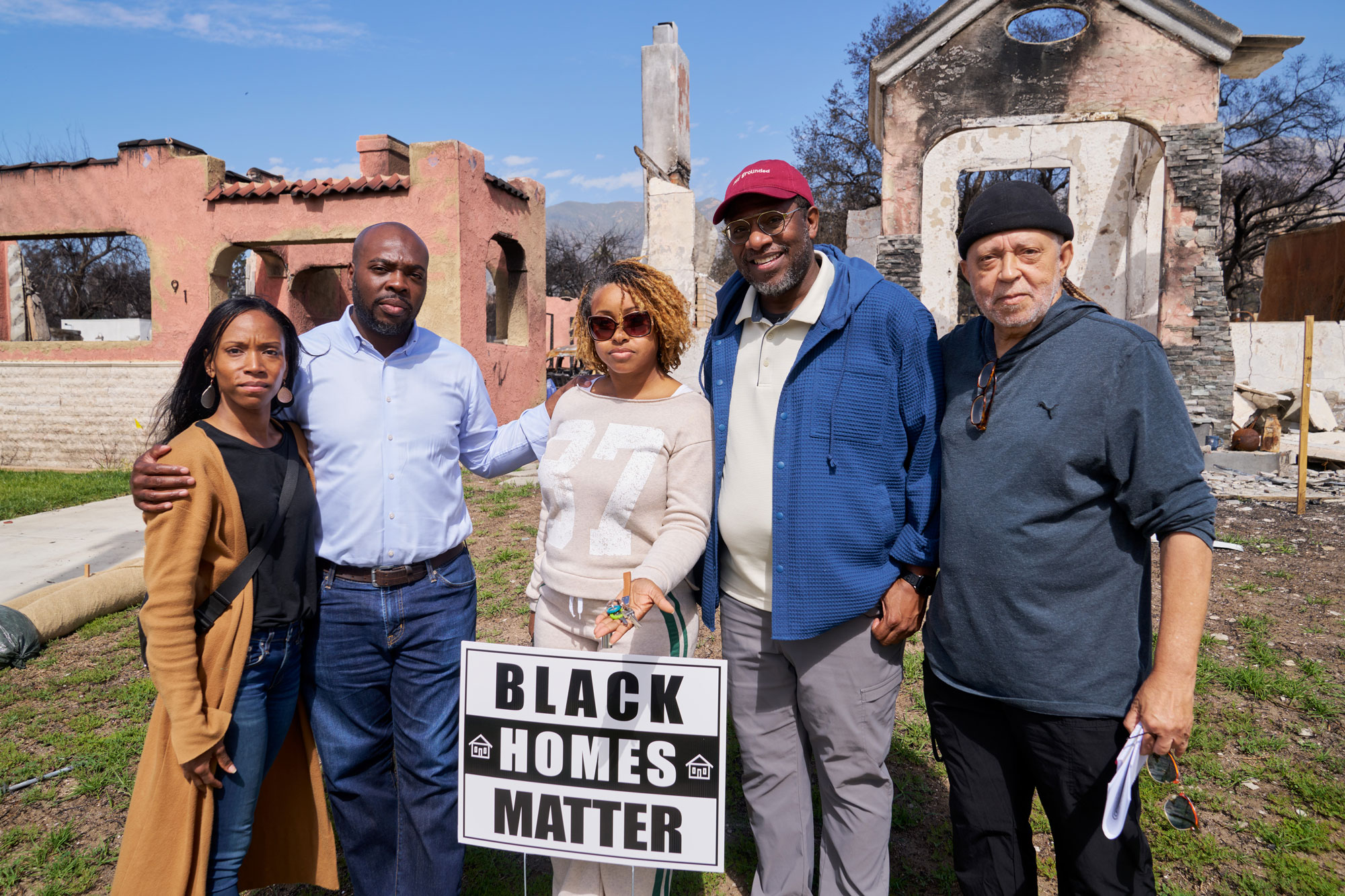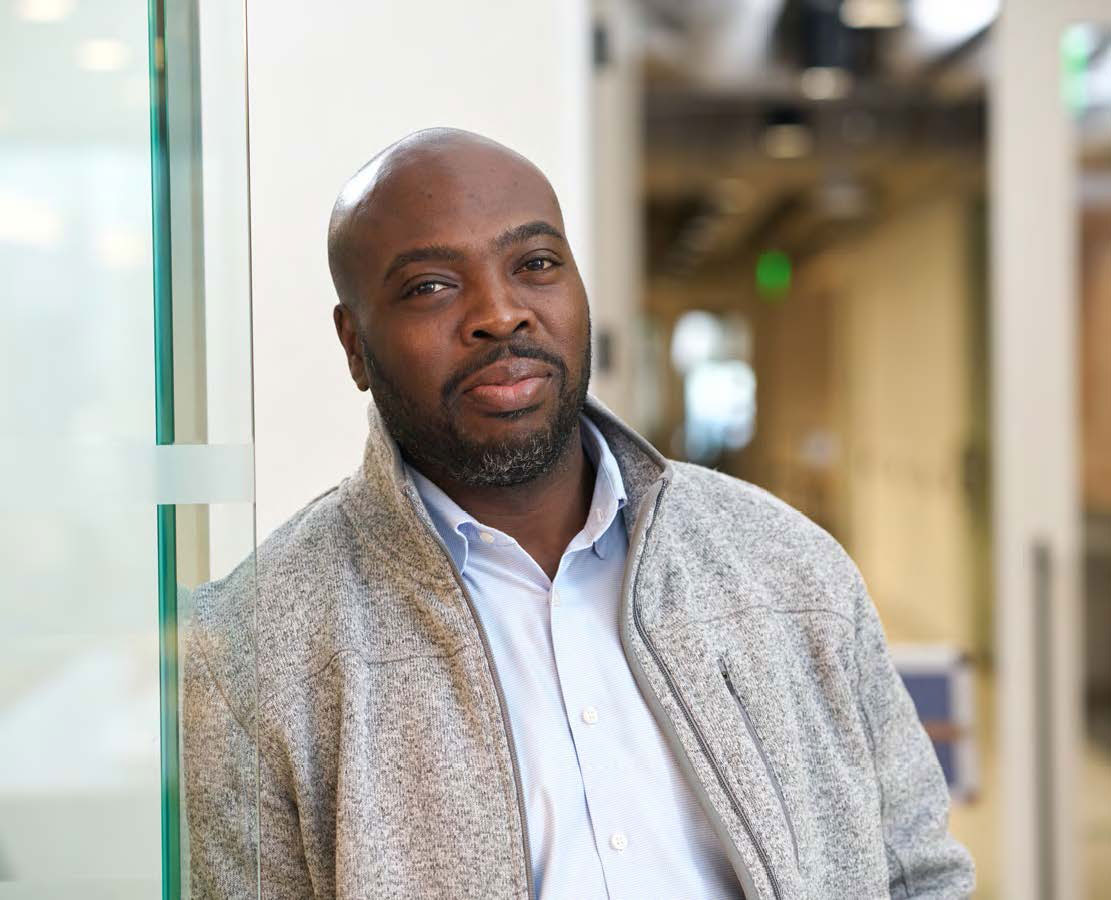Power builder Power builder Power builder
From the UW’s Evans School to national racial justice leadership, Marc Philpart is helping build a new future through the Black Freedom Fund.
By Hannelore Sudermann | Viewpoint Magazine

Above: Marc Philpart, second from left, stands with partners who are helping L.A.-area Black communities that lost homes and neighborhoods in the January, 2025 Eaton Fire.
Marc Philpart was considering a future in public affairs when he joined a friend on a trip to Seattle. During a visit to the Evans School of Public Policy and Governance, he says, he “met incredible people and was blown away by the level of community and welcomeness I felt there. I decided to take a chance.”
That leap started his journey from graduate student to global public health researcher to national racial justice leader, culminating in Philpart’s role as founding president and CEO of the Black Freedom Fund, a powerful new philanthropic foundation supporting Black grassroots movements for racial justice.

Marc Philpart, executive director of the Black Freedom Fund, has built a career bridging public health, policy and grassroots movement-building.
Philpart, ’07, grew up in South Central Los Angeles and attended Xavier University in New Orleans. Both places grounded him in vibrant Black communities. Coming to Seattle, he expected an adjustment. “But I was surprised at how much of a focal point students of color were,” he says. “I found a home and a community of people looking out for each other.”
At the University, he initially pursued a degree in public affairs, but quickly realized his passions lay at the intersection of health, policy, history and culture. “I wanted to be shaping and acting upon the issues that contribute to our lived conditions,” he says.
He credits mentors at the Evans School and the School of Public Health for helping him find his path. Faculty including Dave Harrison and Amy Hagopian “understood how challenging a university can be—and they supported my curiosity and intellectual growth.”
Philpart worked closely with Aaron Katz, a UW expert in population health, contributing to community-oriented public health practices, and completed master’s degrees in public policy and public health. Along the way, he gained real-world experience through internships in China, Pakistan, Ethiopia, Seattle and Oakland, with the goal of building expertise around community development and systemic change.
He also met local leaders who left lasting impressions including former Seattle mayor Norm Rice. “He took me under his wing,” Philpart says. “He was a coach, a guide and a source of support.”
After graduation, Philpart joined the global health nonprofit PATH, then spent more than a decade at PolicyLink, where he led the Alliance for Boys and Men of Color, building power and opportunity in communities nationwide.
Philpart is a bold advocate for racial equity. Known for his sharp thinking, easy smile and deep attentiveness, he brings both urgency and clarity to the work. He’s quick on his feet and grounded in lived experience.
“What we do is all about giving people on the ground—those most proximate to the issues—a greater voice, so they can name the issues, craft the solutions and chart the path forward.”
Marc Philpart, executive director of the Black Freedom Fund
In 2020, amid a national reckoning following the police killings of Ahmaud Arbery, Breonna Taylor, George Floyd and others, an urgent need arose. People wanted to invest in Black communities and contribute to combating systemic racism.
“There was no real philanthropic mechanism to galvanize the resources pouring in,” Philpart says. “We needed to bridge the funding gap Black-led organizations face and build Black political power.”
That urgency gave rise to the California Black Freedom Fund, a special fund at the Silicon Valley Community Foundation that Philpart managed. It provided unrestricted general operating support to organizations focused on racial justice, democracy and community development. Five years later, the initiative has evolved into a fully independent foundation, the Black Freedom Fund, which Philpart now leads.
With an ambitious goal of building a $200 million endowment, the fund has already distributed $45 million to over 200 California-based organizations working at every level from local organizing to statehouse advocacy.
Philpart sees his work as part of a broader shift in the nonprofit world. “Traditionally, giving has been focused on charity,” he says. “But now, we’re seeing a professionalization of the social justice field. Organizations are operating at every level from the grassroots to legislative halls working to pass transformational reforms that benefit everyone.”
He’s particularly proud of partnerships with both high-profile philanthropists and everyday families—like the relatives of Chinedu Valentine Okobi, a 36-year-old man who died in 2018 at the hands of the San Mateo County Sheriff’s Office. Through the Black Freedom Fund, Okobi’s family launched a sabbatical program to support rest and healing for Black justice leaders.
“What we do is all about giving people on the ground—those most proximate to the issues—a greater voice,” Philpart says. “So they can name the issues, craft the solutions and chart the path forward.”
While the fund is national, its presence is local. It partners with groups in Minnesota, Oregon, Washington and beyond. It has supported recovery and cultural renewal efforts in communities like Altadena, California, where thousands of Black families once subjected to discriminatory housing practices lost their homes and neighborhoods to wildfires in early 2025.
Initial grants helped with basic recovery. But soon, the fund turned to deeper work: financing community-led rebuilding, direct support for under-insured residents and social and cultural programming to help the neighborhood reclaim its identity.
Though based in California, Philpart returns regularly to Seattle, where he connects with nonprofit leaders, supports movement-building and visits his mentors.
We are now in a challenging time where there is uncertainty around the future of race-conscious giving, especially for organizations that traditionally receive some federal support, Philpart says.
“But there’s a lot to be hopeful about,” he adds. “Part of what I think—part of what I believe—is that these moments of crisis can become openings for incredible things to be born.”
Through the Black Freedom Fund, he’s helping to turn this moment of challenge into a movement for change.